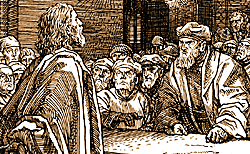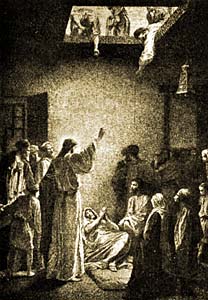What is the “unpardonable sin”?
How does sin become “unforgivable”?
“I would like to just know if what it says in Matthew is true. It states that every sin is forgivable, except if a person speaks badly about the Holy Spirit. I have attended a private Christian school and one day my Bible teacher was saying that a person is not forgiven if he/she speaks against the Holy Spirit. As he stated that… I thought something against the Holy Spirit. I did not mean to… it just happened. I prayed and asked forgiveness, but does that mean I am forgiven or eternally condemned? SINCERELY WORRIED”
Clearly, this student is confused about the true meaning of this biblical reference. Once understood, this young person can rest assured that the unpardonable sin was most certainly not committed in this case. In fact, this sin cannot be committed by a true Christian.

An unforgivable sin is described in Mark 3 and Matthew 12. These passages involve Jesus Christ’s repeated and widespread public defeat of Satan and his demons. Many readers and theologians have been confused about the true nature of this sin. As you read these verses for yourself (below), bear in mind part of the purpose of Jesus Christ’s ministry was to directly confront darkness with the light of truth in a public battle of pure good versus pure evil. The only being in the universe that is more powerful than the Evil One, is God. He is the only one with enough power to bind Satan himself and forcibly dispossess him.
Mark 3:22-30 states,
“And the scribes who came down from Jerusalem said, ‘He has Beelzebub,’ and, ‘By the ruler of the demons He casts out demons.’ …‘Assuredly, I [Jesus] say to you, all sins will be forgiven the sons of men, and whatever blasphemies they may utter; but he who blasphemes against the Holy Spirit never has forgiveness, but is subject to eternal condemnation;’ because they said, ‘He has an unclean spirit’” (NKJV, emphasis added / Note: The Pharisees made the same charge in Mat 9:34.).
In Matthew 12:31-32, Jesus says to the Pharisees,
“Therefore I say to you, every sin and blasphemy will be forgiven men, but the blasphemy against the Spirit will not be forgiven men. Anyone who speaks a word against the Son of Man, it will be forgiven him; but whoever speaks against the Holy Spirit, it will not be forgiven him, either in this age or in the age to come” (NKJV, emphasis added).
What is the context of these statements, and what is the exact sin described?

The Pharisees had long observed the sinless Jesus Christ. They observed him doing undeniable and powerful miracles that were, at the very least, clear evidence of power supplied by God. These impressive miracles were freely given in pure kindness and love to release people from obvious suffering and the oppression of horrible evil.
However, the Pharisees had so firmly set their hearts against accepting Jesus as the Messiah that they rejected the obvious truth before them and perversely twisted it to influence the crowds. They publicly credited the most ultimately evil being in the universe with these precious, godly miracles. In other words, they called the precious and holy Spirit of God, the unclean spirit of Satan. In effect, they charged Jesus Christ with sorcery; one who is in league with Satan. These charges are not only appalling and extremely serious, but clearly absurd. As Jesus immediately responded,
“How can Satan cast out Satan? If a kingdom is divided against itself, that kingdom cannot stand. And if a house is divided against itself, that house cannot stand. And if Satan has risen up against himself, and is divided, he cannot stand, but has an end. No one can enter a strong man’s house and plunder his goods, unless he first binds the strong man. And then he will plunder his house” (Mark 3:23-27; also see Luke 11:14-23).
Note that…
“Jesus does not deny the existence of other exorcists here. [See: Matthew 7:22-23] …Exorcists often invoked a higher spirit to get rid of a lower one. …But a demon’s retreat that meanwhile drew attention to another of Satan’s servants would only be a strategic retreat; such possible activity contrasts with the wholesale exorcizing of the masses that Jesus undertakes, which clearly signifies a defeat of Satan [Matthew 12:29; 4:24; 8:16; Mark 1:34, 39; 5:12, 15; Luke 9:1] …the parable about tying up a protective householder means that Jesus had defeated Satan and could therefore plunder his possessions--free the demon-possessed” [Craig S. Keener, The IVP Bible Background Commentary, New Testament (Downers Grove, Illinois: InterVarsity Press, 1993), pp. 143, 80.].
Author Dr. Henry Morris insightfully clarifies the true nature of Pharisees’ sin:
“The unforgivable sin of speaking against the Holy Spirit has been interpreted in various ways, but the true meaning cannot contradict other Scripture. It is unequivocally clear that the one unforgivable sin is permanently rejecting Christ (John 3:18; 3:36). Thus, speaking against the Holy Spirit is equivalent to rejecting Christ with such finality that no future repentance is possible. ‘My spirit shall not always strive with man,’ God said long ago (Genesis 6:3).
…In the context of this particular passage (Matthew 12:22-32), Jesus had performed a great miracle of creation, involving both healing and casting out a demon, but the Pharisees rejected this clear witness of the Holy Spirit. Instead they attributed His powers to Satan, thus demonstrating an attitude permanently resistant to the Spirit, and to the deity and saving Gospel of Christ” —Henry M. Morris, The Defender’s Study Bible (Iowa Falls, Iowa: World Bible Publishers, 1995), emphasis added.
What is the difference between the two types of blasphemy described in Matthew 12? Why is the sacrifice of Christ ineffective as an atonement for the sin of blasphemy against the Holy Spirit?
Respected Christian theologian Dr. F.F. Bruce writes,
“…Speaking against the Son of man might be due to a failure to recognize Him for what He is. So Paul recalls how in his pre-Christian days he thought it his duty to oppose the name of Jesus of Nazareth. But if, having seen the light on the Damascus road, he had deliberately closed his eyes to it and kicked out against the goad which was directing him into the true path, that would have been the sin against the Holy Spirit.
The Holy Spirit persuades and enables men to accept Christ and enjoy the saving benefits of the gospel [John 16:8; 1 Corinthians 2:12-14; Acts 7:51], but if anyone refuses to submit to the Spirit’s gracious constraint, preferring to call good evil and evil good, how can the gospel avail for him? The deliberate refusal of the grace of God is the one sin which by its very nature is irremediable” —F.F. Bruce, Answers to Questions (Grand Rapids, Michigan: Zondervan Publishing House, 1973), pp. 46-47.
“Anyone who rejects the Holy Spirit’s convicting influence and does not repent will not be forgiven, ‘neither in this world, neither in the world to come’ (Matthew 12:32).” —Ray Comfort, “The Unpardonable Sin,” The Evidence Bible (Gainesville, Florida: Bridge-Logo Publishers, 2001)
“Jesus thus regards blasphemy against the Spirit—permanently rejecting his identity (Matthew 12:18) as attested by the Spirit’s works (Matthew 12:28)—as the worst of sins” —Craig S. Keener, The IVP Bible Background Commentary, New Testament (Downers Grove, Illinois: InterVarsity Press, 1993), p. 80

The situation was similar at the biblical city of Capernaum, where Jesus Christ performed an extraordinary number of miracles and taught many important public lessons. In the end, most of the people of Capernaum remained unrepentant. Like the Pharisees, they persistently rejected the convicting ministry of the Holy Spirit who bore witness to the true identity of Jesus Christ, their Messiah.
They turned away from the abundant light graciously provided to them, and chose to remain forever in their unbelief. They persistently refused to listen to anything the Holy Spirit was telling them. Like the Pharisees, they chose self-imposed blindness. For this reason, they were strongly judged. “For unto whomsoever much is given, of him shall be much required…” (Luke 12:48). Thus, along with nearby Chorazin and Bethsaida, Capernaum received a very stern warning from Jesus, “It shall be more tolerable for the land of Sodom in the day of judgment, than for thee” (Matt. 11:21-24).
How can one know whether or not they have committed “the unforgivable sin?”
Bible researcher Larry Richards points out,
“This reference to an unforgivable sin has troubled many unnecessarily. Those who are concerned that they have done something for which Jesus will not forgive them show a very different attitude from the Pharisees, who refused to accept even the most compelling evidence that Jesus was the Son of God. The person who rejects the Spirit’s message about Jesus will not be forgiven. Anyone who seeks Jesus’ forgiveness certainly has not committed the unforgivable sin” [Larry Richards, 735 Baffling Bible Questions Answered (Grand Rapids, Michigan: Fleming H. Revell, 1993), pp. 241-242.].
Scholars Morris and Clark further explain:
“Persons deeply troubled by a guilty conscience often fear that they have sinned too grievously for God to forgive and save them. Others, dominated by a carnal, calculating attitude, hope to sin to the limit and then come to Christ to escape the consequences. Thus with radically different motives, both ask ‘Is it possible to sin beyond the point of being saved?’
God’s ability to save is not limited by man’s sinfulness. In fact, every person, before he accepts Jesus Christ as Savior, is in total rebellion against God, though sinfulness many not manifest itself with equal intensity in every person. The Apostle John taught believers,
‘If any man sin, we have an advocate with the Father, Jesus Christ the righteous; and He is the propitiation (satisfaction) for our sins, and not for ours only, but also for the sins of the whole world’ (1 John 2:1-2).
The Bible is filled with examples of people who receive forgiveness for all manner of wickedness, for ‘the Lord’s hand is not so short that it cannot save’ (Isaiah 59:1 NASB). God’s boundless grace prompted Paul to exclaim,
…where sin abounded, grace abounded much more. —Romans 5:20 NKJV excerpt
And Paul’s personal testimony showed God’s redemptive purpose and power were not limited by man’s sinfulness, thus encouraging those who feared they had sinned too grievously to be saved (1 Timothy 1:15-16).
While God’s ability to save is boundless, the Bible clearly shows that there are certain conditions under which He will not save. For instance, God will not save those who neglect or despise Christ’s sacrifice in an effort to find an alternate salvation plan.
‘For if we go on sinning willfully after receiving the knowledge of truth, there no longer remains a sacrifice for sins.’ —Hebrews 10:26 NASB

This warning pertains to those who ‘trample under foot the Son of God’ and regard His blood as unclean (Hebrews 10:29 NASB). God the Father has appointed His Son’s sacrifice as the sole way of salvation and will not grant salvation to those who seek it by any other means.
The book of Romans contains the most concentrated teaching on the subject of salvation to be found in the New Testament, and it begins with a panorama of man’s sin. Those who rejected God’s revelation concerning Himself and worshipped idols instead were given over by God to a more severe moral defilement (Romans 1:22-24). Those who worshipped man instead of God received equally severe punishment: ‘For this reason God gave them over to degrading passions,’ the result being rampant immorality and homosexuality (Romans 1:26-27).
‘And just as they did not see fit to acknowledge God any longer, God gave them over to a depraved mind, to do those things which are not proper’ —Romans 1:28 NASB
Several conclusions can be drawn from these warnings.
First, God actively punishes unconfessed sin not only after the sinner’s death, but also during that person’s life.
Also, moral degradation is a punishment of God upon willful spiritual ignorance.
Further, when God gives one over to a depraved mind, that person’s sensitivity to sin is deadened and his chances for repentance thereby lessened.
Yet, God does not violate man’s freedom, forcing man to sin and then judging him for it. Rather, men in this state welcome more extreme degradation and actively embrace it: who being past feeling, have given themselves over unto lasciviousness, to work all uncleanness with greediness (Ephesians 4:19).
Consequently, Scripture states both that Pharaoh hardened his heart against God, and that God hardened Pharaoh’s heart (Exodus 8:32; 9:12).
The Holy Spirit convicts men of their sin and draws them to the Savior (John 16:8-11; John 3:5-6). Yet, at least once in history, God has punished iniquity by withdrawing His Spirit. Prior to the world-wide flood, God said, ‘My Spirit will not strive with man forever,’ and then He appointed 120 years during which repentance could be made (Genesis 6:3). Instead of repenting, man used God’s longsuffering as an occasion for further sin, and only Noah and his family were spared.
God has further declared that He will not forgive blasphemy against the Holy Spirit (Matthew 12:31).
…If one’s conscience is bothering him to the point that he feels he is too guilty for God to forgive, he has the assurance of God’s Word that forgiveness is possible. The very fact that he is bothered by his sinfulness shows that the Holy Spirit has not abandoned him nor has God given him over to a depraved mind.
The real danger arises, however, when one can continually violate God’s law and never feel the slightest remorse over his rebellion. The Bible’s warning should jolt the spiritually flippant out of their complacency:”
“It is a terrifying thing to fall into the hands of the living God” —Hebrews 10:31 KJV
“Seek the Lord while He may be found; call upon Him while He is near. Let the wicked forsake his way, and the unrighteous man his thoughts; and let him return to the Lord, and He will have compassion on him; and to our God, for He will abundantly pardon” —Isaiah 55:6-7 KJV
[Henry M. Morris and Martin E. Clark, The Bible Has the Answer, Revised and Expanded (Green Forest, Arkansas: Master Books, 1976), pp. 244-246, emphasis added.]
George Standison and staff further clarify,
“ With this exception [the unforgivable sin], there is nothing in the category of human offenses that is beyond the reach of divine forgiveness.
Although your sins be like scarlet, they shall be white as snow.
is the ancient promise given by God to men;
‘though they be like crimson, they shall be as wool.’ —Isaiah 1:18 KJV
This is not to be interpreted, however, as an encouragement to sin, but rather as an inducement to repentance. If the sinner truly repents, imploring God’s forgiveness for Jesus’ sake; if he accepts him as Saviour and endeavors, with divine help, to live thereafter a Christian life, he will not only be forgiven, but will be kept from falling back into sin. This is the teaching of the Gospel, and it is exemplified in innumerable cases today. We have many instances everywhere of great sinners who have forsaken their evil ways and who are now living the new life, sustained by divine power.
‘There’s a wideness in God’s mercy
Like the wideness of the sea.’We have the Saviour’s distinct assurance, ‘Him that cometh unto me, I will in no wise cast out’ (John 6:37 KJV). There is no punishment for sins that are forgiven. ‘Jesus paid it all’” —Bible Answers for 1000 Difficult Questions (Iowa Falls: World Bible Publishers)
If you, dear reader, have not yet truly repented of your sins and asked our Lord Jesus Christ for the total forgiveness and salvation that only his precious blood can provide, we urge you to do so immediately. It is the wisest decision you can ever make!
Can a Christian commit “the unpardonable sin”?

Authorities agree that the answer is no. Here’s why.
“If we refuse to accept the testimony given to us by the Holy Spirit, fight off His conviction of our sin, and never accept the truth, we will never come to Christ for salvation. In Christ, all our sins are forgiven. Therefore, no Christian can commit the unpardonable sin. Only an unregenerate person who refuses to come to Christ will die in his or her sins.” —Freedom in Christ (Knoxville, Tennessee: FICM.org, 2002)
“…once you accept Jesus, that part of the Holy Spirit’s job is complete, thus you can’t blaspheme His work. Naturally, He continues to work with you, and you can be stubborn and resist Him as a Christian, but you can’t blaspheme Him. Live unproductively, carnal and unspiritual, possible. But commit the unpardonable sin? It’s just not possible for a true Christian. Remember what Paul said:” —Darrin Yeager (DYeager.org, 2002)
“There is therefore now no condemnation to those who are in Christ Jesus…” (Romans 8:1).
A true Christian cannot commit a sin for which there is no forgiveness. We are protected by the power of God (1 Peter 1:5). Although we can certainly grieve the Holy Spirit, he still seals us for the day of redemption (Ephesians 4:30). The Apostle Paul was confident “that He who has begun a good work in you will complete it until the day of Jesus Christ” (Philippians 1:6 NKJV).
Bear in mind, however, if someone who claims to be a Christian is responding to the Holy Spirit and Christ in a way very similar to that of the Pharisees, despite the strong witness of the Holy Spirit and abundant exposure to the truth of God’s Word, it is highly doubtful that the person was ever saved. Only God knows for sure. The evidence clearly points to an unregenerate heart.
“…for a tree is known by its fruit. …For out of the abundance of the heart the mouth speaks” (Matthew 12:33-34 NKJV).
More information
Author: Paul S. Taylor, Christian Answers.
Web page Copyright © 2002, Eden Communiations, All Rights Reserved—except as noted on attached “Usage and Copyright” page that grants ChristianAnswers.Net users generous rights for putting this page to work in their homes, personal witnessing, churches and schools.

